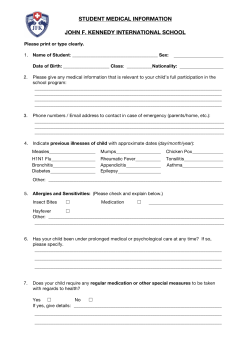
File
CHAPTER 31 New Frontiers: Political and Social Change In The 1960s I. Kennedy’s rise o A. The election of 1960 o 1. Backgrounds of the candidates o 2. The campaign o o a. Kennedy’s Catholicism not a problem o b. Televised debates favor Kennedy o c. The civil rights issue 3. Results B. Kennedy’s administration o 1. Cabinet appointments emphasize youth o 2. The “Kennedy style“ displayed at the inauguration II. The Kennedy record o A. Congress Democratic but conservative o B. Legislative successes o 1. The Peace Corps and the Alliance for Progress o 2. Trade Expansion Act o 3. Domestic social legislation o C. The Warren Court on civil liberties o D. Civil rights under Kennedy o 1. Kennedy at first hesitant to act o 2. Greensboro sit-ins o a. Based on King’s “militant nonviolence“ philosophy o b. Creation of SNCC o 3. Freedom riders o 4. Integration of the University of Mississippi o 5. King’s Letter from Birmingham City Jail o 6. Kennedy endorses civil rights o 7. Wallace’s defiant gesture o 8. March on Washington o o o a. High point of movement o b. King’s “I Have a Dream“ speech 9. Modest progress in cities such as Atlanta III. Foreign frontiers o A. Bay of Pigs disaster o o o o 1. 1,500 anti-Castro Cubans prepared by CIA o 2. Failure of invasion B. Berlin Wall o 1. Khrushchev threatens to limit access to Berlin o 2. Kennedy calls up Reserve and Guard units o 3. Soviets construct Berlin Wall C. Cuban missile crisis o 1. Discovery of missiles in Cuba o 2. Kennedy imposes naval quarantine o 3. Khrushchev blinks o 4. Aftereffects o a. Lowered tensions o b. Sale of wheat o c. Washington-Moscow “hot line“ o d. Removal of obsolete missiles o e. Nuclear test ban treaty D. Vietnam o 1. Neutrality for Laos o 2. Premier Ngo Dinh Diem o a. Lack of economic and social reform o b. Opposition to Diem o c. Overthrow of Diem and later military regimes IV. The end of Kennedy’s administration o A. Assassination in Dallas o B. Lee Harvey Oswald o C. Jack Ruby o D. Chief Justice Earl Warren V. Lyndon Johnson and the Great Society o A. Johnson’s background and style o B. Passing Kennedy’s legislative program o o 1. A major tax cut o 2. The Civil Rights Act of 1964 C. Declaring war on poverty o 1. Michael Harrington’s The Other America o 2. An economic-opportunity bill o 3. The Great Society o D. The election of 1964 o o o 1. Republicans o a. Sought “a choice, not an echo“ o b. Nominated Barry Goldwater o c. Goldwater’s weaknesses o 2. Johnson’s appeal for consensus o 3. Landslide victory for Johnson E. Landmark legislation o 1. Medicare o 2. Federal aid to education o 3. Appalachian Regional Development Act o 4. Housing and Urban Development Act o 5. Immigration and Nationality Services Act F. Assessing the Great Society VI. From civil rights to black power o A. Voting Rights Act of 1965 o B. Rise of the black power movement o 1. Riots in 1965 and 1966 o 2. Condition of urban blacks o 3. Philosophy of the black power movement o 4. Malcolm X and other leaders o 5. Positive effects of the black power movement o a. Helped African Americans take pride in their racial heritage o b. Forced King and others to focus attention on plight of inner-city blacks VII. The tragedy of Vietnam o o o o A. Efforts to avoid defeat o 1. Escalation o 2. The cost of the war B. The Tonkin Gulf resolution o 1. Response to attack on American destroyers o 2. Johnson interprets as congressional approval for war C. Escalation in 1965 o 1. Attack at Pleiku o 2. Operation Rolling Thunder o 3. Combat troops to Vietnam D. The context for policy o o 1. Consistent with containment o 2. Goal of American involvement o 3. Erosion of support E. The turning point o 1. The Tet offensive o 2. Further erosion of support o 3. Presidential primaries become referendums on Johnson’s Vietnam policy o 4. Johnson announces that he will not seek another term VIII. Sixties crescendo o o A. Tragedies of 1968 o 1. Assassination of Martin Luther King Jr. o 2. Assassination of Robert Kennedy B. The election of 1968 o o o o 1. Democrats o a. Nominate Hubert Humphrey o b. The disastrous Chicago convention 2. Republicans o a. Nominate Richard Nixon o b. Represent stability and order 3. George Wallace o a. Candidate of the American Independent party o b. Appeal to social conservatives 4. Narrow victory for Nixon
© Copyright 2025





















